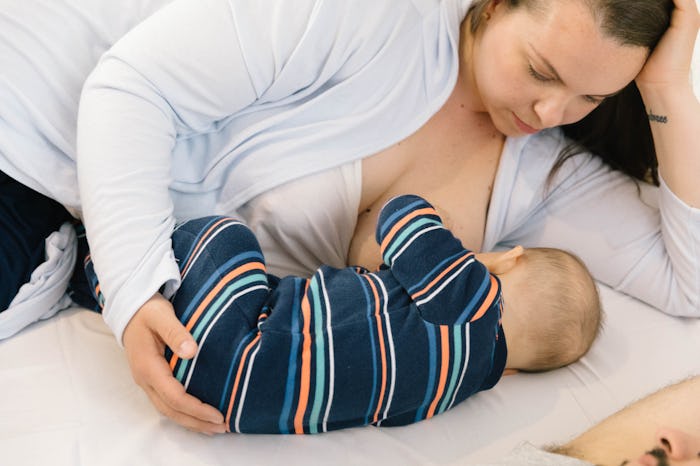Life
Here's When Breastfeeding Should *Really* Stop Hurting, According To Experts
While I was struggling to establish breastfeeding, my lovely OB-GYN called to tell me about a patient who ran triathalons, Ironmans, marathons — you name it. She was one tough cookie, who, unsurprisingly, rocked her birth. But when it came time to breastfeed, she broke down and cried. According to one ultra-strong lady, at least, breastfeeding really can hurt — especially at first. But is that amount of suffering normal? When does breastfeeding stop being painful, and become the nourishing — if exhausting — experience you wished for?
According to Kristin Gourley, International Board Certified Lactation Consultant (IBCLC) Manager of Lactation Link, "It is common to have nipple soreness and pain at the initial latch-on for about the first 30 to 60 seconds of the feeding, for the first few weeks after birth." You can blame changing hormones and nipple stretching for this period of adjustment. But this didn't sound like the excruciating pain experienced by my doctor's patient, and in fact, how soon you'll be breastfeeding comfortably depends on the type of pain you have.
"If the pain is sharp, toe-curling, or doesn't subside during the feeding, then this is less likely to get better over time," Gourley explains to Romper. Ask your hospital to recommend a lactation consultant, and the sooner the better. (After all, your nipples can only take so much.)
"Breastfeeding isn't about 'gritting your teeth and bearing it,'" Gourley says. "If you had a consistent pain anywhere else in your body you would seek out help and you should do the same with regards to nipple pain while breastfeeding!"
Good help for a breastfeeding issue means more than a cursory look at your baby's latch, according to Tania Archbold, B.Sc, IBCLC, of Mother's Nectar Lactation Consultant Services. Archbold tells Romper that a good lactation consultant should take a thorough history and observe a full breastfeeding session to find out what's up. In an interview with Romper, she explains that a common cause of pain is a too-shallow latch. "There are many different reasons why this might happen," writes Archbold, "and a skilled breastfeeding-support person . . . should examine the parent and the baby for physical reasons why the baby is unable to latch well."
Angie Natero, RN IBCLC, agrees with Gourley and Archbold, and tells Romper that extreme pain while nursing should be treated immediately. She adds that any initial discomfort should improve "drastically" within two to three weeks, and that there should come a point when "breastfeeding is completely comfortable."
"Some moms will never experience any pain with breastfeeding, but some initial soreness or discomfort is common for many moms as the dyad learn to navigate the journey of breastfeeding correctly," writes Natero.
I always assumed breastfeeding would come naturally, but in fact, nursing is a learned skill. While mild breastfeeding discomfort is normal for the first few weeks, you should seek expert help for crippling pain. Keep in mind also that breastfeeding should never cause injury, "such as blisters, cracks or bleeding," Natero maintains. "Overall, the great news is there's almost always a fix to help, and with the proper assessment and guidance, moms can go on to have a comfortable, enjoyable and long lasting . . . breastfeeding experience."
Check out Romper's new video series, Romper's Doula Diaries:
